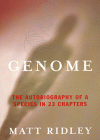|
|
|
| home | genetic news | bioinformatics | biotechnology | literature | journals | ethics | positions | events | sitemap |
Ridley M. 2000. Genome: The Autobiography of a Species in 23 Chapters
|
 Genome : The Autobiography of a Species in 23 Chapters Genome : The Autobiography of a Species in 23 Chapters by Matt Ridley Harpercollins ISBN: 0060194979 (February 2000)
Book Description The human genome, the complete set of genes housed in twenty-three pairs of chromosomes, is nothing less than an autobiography of our species. Spelled out in a billion three-letter words using the four-letter alphabet of DNA, the genome has been edited, abridged, altered and added to as it has been handed down, generation to generation, over more than three billion years. With the first draft of the human genome due to be published in 2000, we, this lucky generation, are the first beings who are able to read this extraordinary book and to gain hitherto unimaginable insights into what it means to be alive, to be human, to be conscious or to be ill. By picking one newly discovered gene from each of the twenty-three human chromosomes and telling its story, Matt Ridley recounts the history of our species and its ancestors from the dawn of life to the brink of future medicine. He finds genes that we share with bacteria, genes that distinguish us from chimpanzees, genes that can condemn us to cruel diseases, genes that may influence our intelligence, genes that enable us to use grammatical language, genes that guide the development of our bodies and our brains, genes that allow us to remember, genes that exhibit the strange alchemy of nature and nurture, genes that parasitise us for their own selfish ends, genes that battle with one another and genes that record the history of human migrations. From Huntington's disease to cancer, he explores the applications of genetics: the search for understanding and therapy, the horrors of eugenics and the philosophical implications for understanding the paradox of free will. In association with Amazon.com
|
Wanner. Höfner. 2007. Mass Spectrometry in Medicinal Chemistry. Mirkin. Niemeyer. 2007. Nanobiotechnology II: More Concepts and Applications Marx. Sandig. 2006. Drug Testing In Vitro: Breakthroughs and Trends in Cell Culture Technology Hillenkamp. Peter-Katalinic. 2007. MALDI MS: A Practical Guide to Instrumentation, Methods and Applications Call for Chapters for the Handbook of Research on Systems Biology Applications in Medicine OpenHelix announces free trial subscriptions to its database of tutorials on genomic resources Junghans et al. 2006. Intellectual Property Management Cold Spring Harbor Laboratory Press to Launch CSH Protocols Sabaté et al. 2003. Adherence to Long-Term Therapies: Evidence for Action (WHO) Pathy. 2005. Principles and Practice of Geriatric Medicine. 4th Edition Brigelius-Flohé. Joost. 2006. Nutritional Genomics more news ... |
Generated by News Editor 2.0 by Kai Garlipp
WWW: Kai Garlipp,
Frank S. Zollmann.
7.0 © 1995-2026 HUM-MOLGEN. All rights reserved.
Liability, Copyright and Imprint.